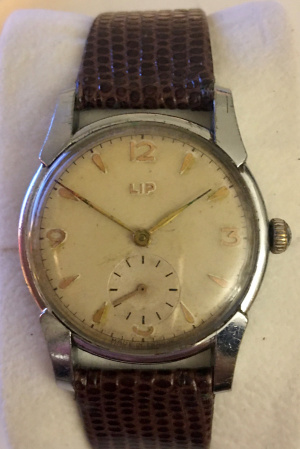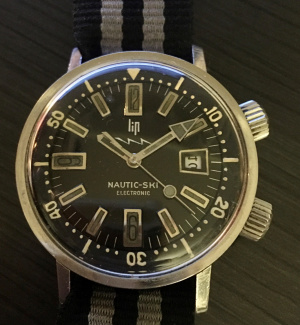LIP: Difference between revisions
| Line 3: | Line 3: | ||
LIP is a French watch and clock company. The LIP factory, based in Besançon in eastern France, began to experience financial problems in the late 1960s and early 1970s, and management decided to attempt a factory shutdown. However, after strikes and a highly publicized factory occupation in 1973, LIP became worker-managed. All the fired employees were rehired by March 1974, but the firm was liquidated again in the spring of 1976. | LIP is a French watch and clock company. The LIP factory, based in Besançon in eastern France, began to experience financial problems in the late 1960s and early 1970s, and management decided to attempt a factory shutdown. However, after strikes and a highly publicized factory occupation in 1973, LIP became worker-managed. All the fired employees were rehired by March 1974, but the firm was liquidated again in the spring of 1976. | ||
==History== | ==History== | ||
[[File:Lip 1930a.jpg|thumb]] | |||
1867 - Emmanuel Lipman and his sons founded a clockwork workshop under the name of Comptoir Lipmann. In 1893 it became the Société Anonyme d'Horlogerie Lipmann Frères (Lipmann Brothers Clock Factory). | 1867 - Emmanuel Lipman and his sons founded a clockwork workshop under the name of Comptoir Lipmann. In 1893 it became the Société Anonyme d'Horlogerie Lipmann Frères (Lipmann Brothers Clock Factory). | ||
Latest revision as of 03:01, 30 April 2020

LIP
LIP is a French watch and clock company. The LIP factory, based in Besançon in eastern France, began to experience financial problems in the late 1960s and early 1970s, and management decided to attempt a factory shutdown. However, after strikes and a highly publicized factory occupation in 1973, LIP became worker-managed. All the fired employees were rehired by March 1974, but the firm was liquidated again in the spring of 1976.
History

1867 - Emmanuel Lipman and his sons founded a clockwork workshop under the name of Comptoir Lipmann. In 1893 it became the Société Anonyme d'Horlogerie Lipmann Frères (Lipmann Brothers Clock Factory).
The firm launched the Lip stopwatch in 1896. Thereafter Lip became the brand name of the company. They built approximately 2,500 pieces per year. The company launched the first electronic watch in 1952, called "Electronic" (considered 'electronic' rather than electric due to the presence of a diode). The first 'Electronic' models were worn by Charles de Gaulle and U.S. President Dwight D. Eisenhower; while previously in 1948, LIP's iconic T18 model was offered to Winston Churchill.
The Nautic-Ski was launched in 1967 to celebrate the 100th anniversary of the company and has become a firm favourite amongst the electronic faithful with its use of the R184 movement.
However, in the 1960s, this highly specialized company began to have financial troubles. Fred Lipmann, who changed his name to Fred Lip, took the company public in 1967, and Ebauches S.A. (subsidiary of ASUAG, a large Swiss consortium which later became Swatch) took 33% of the shares.
Fred Lip tried to smooth down the growing workers discontent. He spoke to the union workers of taylorism (scientific management), and proposed to increase the number of representatives on the comité d'entreprise (works council, the workers' representation in the factory), in order to have younger representatives. Unrest continued.
Ebauches became the biggest shareholder in 1970, taking control of 43% of the stock. Ebauches then fired 1,300 workers. The next year, the board of directors forced Fred Lip to resign, replacing him with Jacques Saint-Esprit.
LIP built the first French quartz watches in 1973, but had to face increasing competition from the United States and Japan. The firm was forced to start liquidation formalities on April 17, 1973, leading Jacques Saint-Esprit to resign on the same day.

Notable Models
- T10 (La Croix du Sud): created for Jean Mermoz's plane.
- T18: conceived by André Donat,and produced from 1933 to 1949 – a T18 was offered in 1948 to Winston Churchill.
- l'Electronic: 1952 – the first models were worn by Charles de Gaulle and U.S. President Dwight D. Eisenhower.
- Mach 2000: Conceived by Roger Tallon, the designer of the TGV high-speed train.
- Nautic-Ski - 1967
